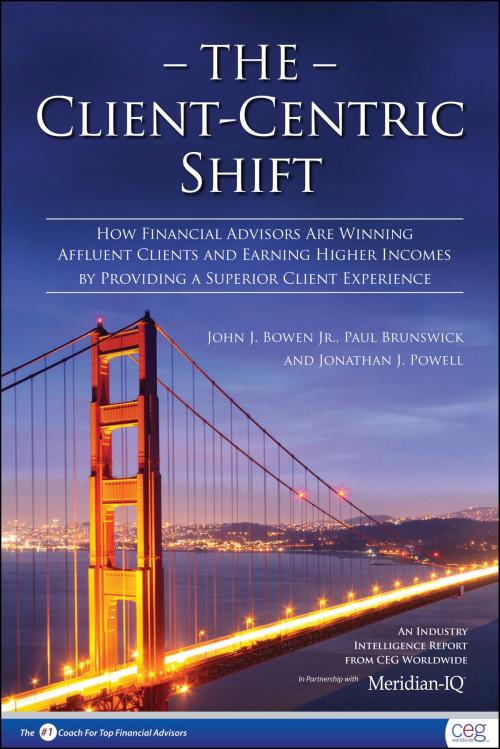| Author: | John J. Bowen Jr., Paul Brunswick, Jonathan J. Powell | ISBN: | 9781626756915 |
| Publisher: | BookBaby | Publication: | December 17, 2012 |
| Imprint: | Language: | English |
| Author: | John J. Bowen Jr., Paul Brunswick, Jonathan J. Powell |
| ISBN: | 9781626756915 |
| Publisher: | BookBaby |
| Publication: | December 17, 2012 |
| Imprint: | |
| Language: | English |
CEG Worldwide has conducted research in the financial services industry for more than a decade. As we all know, much has changed in the industry during those years. Economic upheaval, market turbulence and regulatory changes have all affected how financial advisors serve their clients and manage their practices. Client attitudes and expectations have changed, as well. Yet one thing has endured: There has consistently been one group of financial advisors who have set themselves apart from all others. By taking distinct actions that grow their businesses while serving their clients extremely well, these financial advisors have achieved levels of success that others in the industry have only dreamed of. At CEG Worldwide, our focus throughout the past decade has been on identifying these best practices and then sharing them with the industry. We do this both through research reports such as The Client-Centric Shift and through our coaching programs for financial advisors. Our goal, as ever, is to help financial advisors to increase their incomes and practice equity and to greatly improve the quality of their lives—all while serving their clients well. In our recent studies, we have polled only financial advisors who were well-established in the industry—those who had practiced for a minimum of five years and managed at least $50 million in assets. These studies produced a wealth of information on the best practices of these elite financial advisors—practices that have subsequently been adopted by many across the industry, with excellent results. As useful as these studies have been, at this juncture we decided that we wanted a view of the entire industry, not just of its elite segment. We believed that broadening our view could provide an even sharper understanding of how the practices of the more-successful financial advisors differ from—and are similar to—those of their less-successful counterparts. To this end, we conducted an online survey in August 2012 that sampled a population of more than 380,000 financial advisors nationwide. Our 2,128 respondents answered a battery of questions about how they attract and serve clients, manage their practices, and view their own satisfaction. From the data, we were able to draw a clear picture of the state of financial advisors today. We cover this in the first section of this report, The Study Group: A Snapshot of the Industry Today. Next, we found that many financial advisors across all three income groups share key characteristics. We believe the data tell an emerging story of a fundamental shift in financial advisors’ priorities over the past decade—a shift that we believe can set the stage for greater financial advisor success and client satisfaction moving forward. We tell this story in the second part of this report, The Client-Centric Shift: The Lessons Learned from the Past Decade. We then zeroed in on the specific practices and priorities of the high-income financial advisors that separate them from the rest. We will see how these financial advisors leverage their client-centricity as a springboard for greater success and client satisfaction. By adopting these practices, we believe that all financial advisors can move to higher levels of success even as they serve their clients better. We delve into these practices in the final major section of our report, Leveraging the Client-Centric Approach: The Actions That Produce Superior Results.
CEG Worldwide has conducted research in the financial services industry for more than a decade. As we all know, much has changed in the industry during those years. Economic upheaval, market turbulence and regulatory changes have all affected how financial advisors serve their clients and manage their practices. Client attitudes and expectations have changed, as well. Yet one thing has endured: There has consistently been one group of financial advisors who have set themselves apart from all others. By taking distinct actions that grow their businesses while serving their clients extremely well, these financial advisors have achieved levels of success that others in the industry have only dreamed of. At CEG Worldwide, our focus throughout the past decade has been on identifying these best practices and then sharing them with the industry. We do this both through research reports such as The Client-Centric Shift and through our coaching programs for financial advisors. Our goal, as ever, is to help financial advisors to increase their incomes and practice equity and to greatly improve the quality of their lives—all while serving their clients well. In our recent studies, we have polled only financial advisors who were well-established in the industry—those who had practiced for a minimum of five years and managed at least $50 million in assets. These studies produced a wealth of information on the best practices of these elite financial advisors—practices that have subsequently been adopted by many across the industry, with excellent results. As useful as these studies have been, at this juncture we decided that we wanted a view of the entire industry, not just of its elite segment. We believed that broadening our view could provide an even sharper understanding of how the practices of the more-successful financial advisors differ from—and are similar to—those of their less-successful counterparts. To this end, we conducted an online survey in August 2012 that sampled a population of more than 380,000 financial advisors nationwide. Our 2,128 respondents answered a battery of questions about how they attract and serve clients, manage their practices, and view their own satisfaction. From the data, we were able to draw a clear picture of the state of financial advisors today. We cover this in the first section of this report, The Study Group: A Snapshot of the Industry Today. Next, we found that many financial advisors across all three income groups share key characteristics. We believe the data tell an emerging story of a fundamental shift in financial advisors’ priorities over the past decade—a shift that we believe can set the stage for greater financial advisor success and client satisfaction moving forward. We tell this story in the second part of this report, The Client-Centric Shift: The Lessons Learned from the Past Decade. We then zeroed in on the specific practices and priorities of the high-income financial advisors that separate them from the rest. We will see how these financial advisors leverage their client-centricity as a springboard for greater success and client satisfaction. By adopting these practices, we believe that all financial advisors can move to higher levels of success even as they serve their clients better. We delve into these practices in the final major section of our report, Leveraging the Client-Centric Approach: The Actions That Produce Superior Results.















